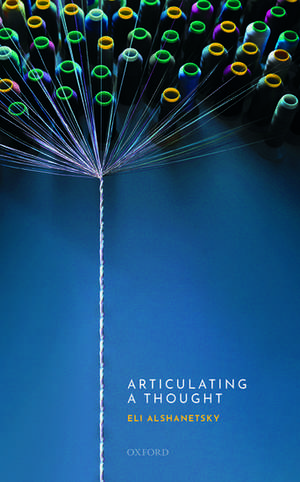Articulating a Thought
Autor Eli Alshanetskyen Limba Engleză Hardback – 5 dec 2019
Preț: 458.49 lei
Preț vechi: 508.98 lei
-10% Nou
Puncte Express: 688
Preț estimativ în valută:
87.74€ • 95.28$ • 73.70£
87.74€ • 95.28$ • 73.70£
Carte tipărită la comandă
Livrare economică 12-18 aprilie
Preluare comenzi: 021 569.72.76
Specificații
ISBN-13: 9780198785880
ISBN-10: 0198785887
Pagini: 174
Dimensiuni: 143 x 224 x 16 mm
Greutate: 0.33 kg
Editura: OUP OXFORD
Colecția OUP Oxford
Locul publicării:Oxford, United Kingdom
ISBN-10: 0198785887
Pagini: 174
Dimensiuni: 143 x 224 x 16 mm
Greutate: 0.33 kg
Editura: OUP OXFORD
Colecția OUP Oxford
Locul publicării:Oxford, United Kingdom
Recenzii
Eli Alshanetsky has written a valuable and original study of a phenomenon that is familiar to us all, but that has received little scrutiny in recent analytic philosophy: putting our thoughts into words. . . . Alshanetsky has made major contributions to an original and difficult project. . . . anyone working in this area will need to give his work serious consideration.
This book addresses a familiar yet perplexing phenomenon: you have a thought that seems to you to be perfectly coherent and definite, but you have difficulty putting it into words. When you ultimately succeed in expressing the thought, how does this occur? And what enables you to recognize this articulation as correct? These questions parallel those that arise in the Meno paradox, and Alshanetsky's novel response to them bears on that paradox and on a host of other foundational issues in epistemology. He offers an ambitious account of how experience generates a kind of implicit knowledge; explains the process by which this implicit knowledge can yield explicit understanding; and argues that this process [...] exemplifies a type of cognitive agency.[... ] Alshanetsky develops a strikingly rich and original view, one that will be of interest to any philosopher who wants to understand the nature of learning and the varieties of reasoning.
C.I. Lewis was describing philosophical investigation when he wrote: "We all know the nature of life and of the real, though only with exquisite care can we tell the truth about them." But what is the difference between knowing the nature of something, on the one hand, and being able to tell the truth about it, on the other? And how can we move from the former state to the latter? Alshanetsky's fascinating book is the first sustained treatment of these questions since Socrates' discussion of recollection in Plato's Meno. This book makes a crucial contribution not merely to the psychology of self-awareness, but also to philosophical methodology.
This book addresses a familiar yet perplexing phenomenon: you have a thought that seems to you to be perfectly coherent and definite, but you have difficulty putting it into words. When you ultimately succeed in expressing the thought, how does this occur? And what enables you to recognize this articulation as correct? These questions parallel those that arise in the Meno paradox, and Alshanetsky's novel response to them bears on that paradox and on a host of other foundational issues in epistemology. He offers an ambitious account of how experience generates a kind of implicit knowledge; explains the process by which this implicit knowledge can yield explicit understanding; and argues that this process [...] exemplifies a type of cognitive agency.[... ] Alshanetsky develops a strikingly rich and original view, one that will be of interest to any philosopher who wants to understand the nature of learning and the varieties of reasoning.
C.I. Lewis was describing philosophical investigation when he wrote: "We all know the nature of life and of the real, though only with exquisite care can we tell the truth about them." But what is the difference between knowing the nature of something, on the one hand, and being able to tell the truth about it, on the other? And how can we move from the former state to the latter? Alshanetsky's fascinating book is the first sustained treatment of these questions since Socrates' discussion of recollection in Plato's Meno. This book makes a crucial contribution not merely to the psychology of self-awareness, but also to philosophical methodology.
Notă biografică
Eli Alshanetsky is currently an Assistant Professor of Philosophy at Temple University. He received a BA in philosophy and cognitive science from UC Berkeley, and subsequently obtained a PhD in philosophy from New York University in 2014. He was awarded an Andrew W. Mellon Fellowship in the Humanities at Stanford from 2015-2018.
